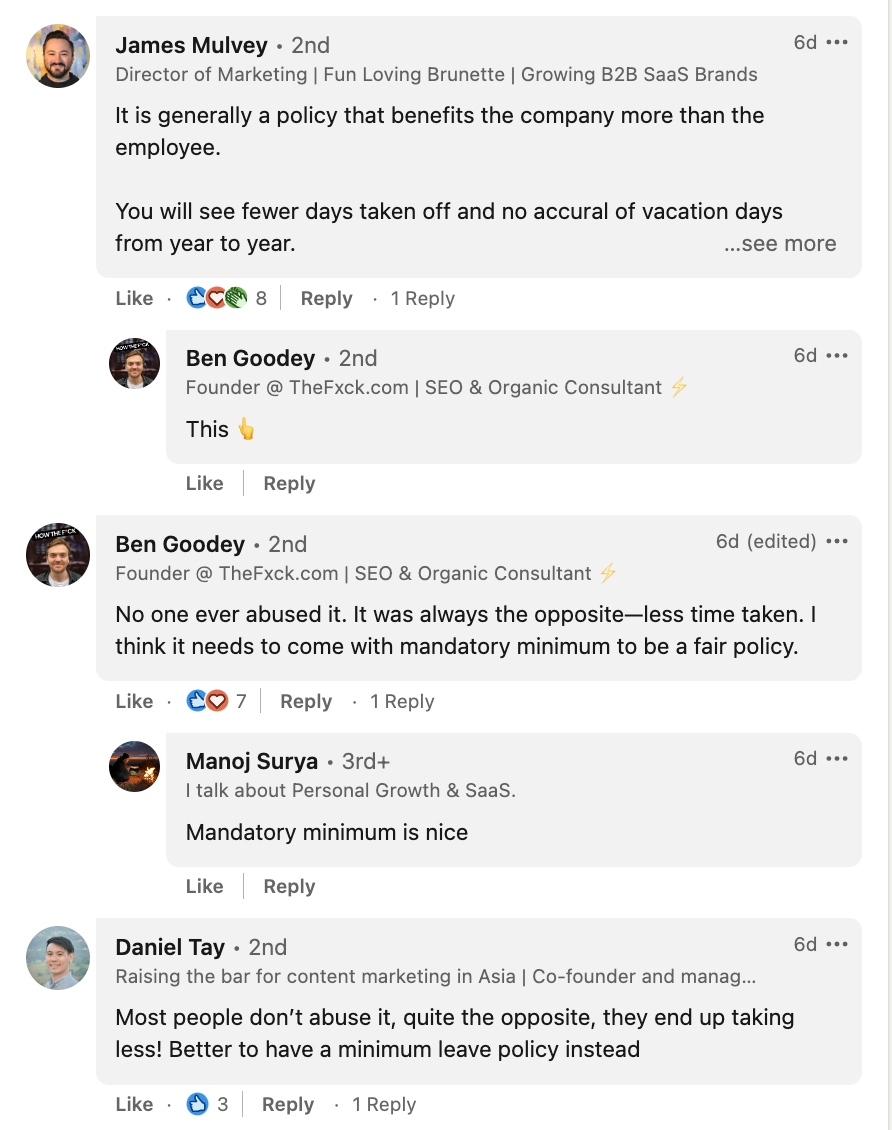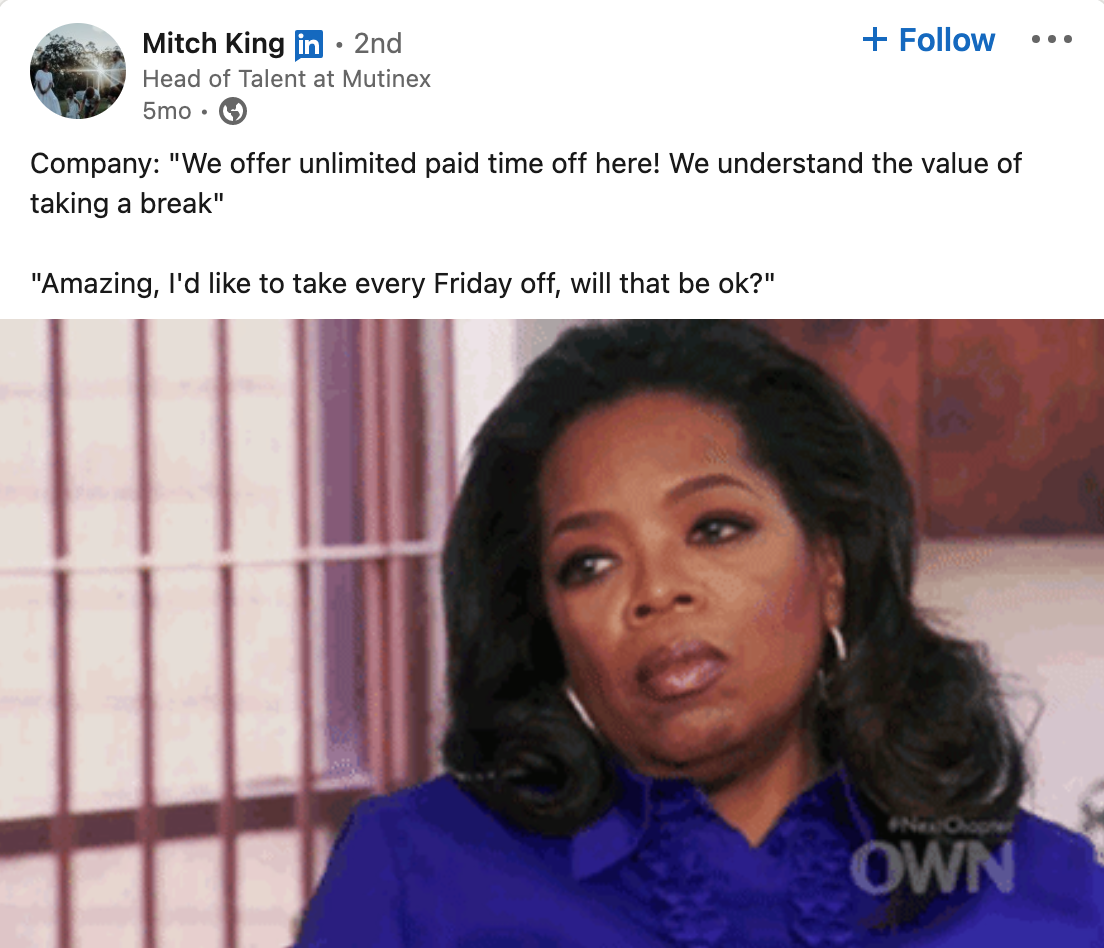Unlimited Paid Time Off (PTO) or Unlimited Vacation Time is a relatively new and trending concept in employee benefits that has been gaining popularity in the past couple of years. In this system, instead of assigning a set number of paid days off to employees at the beginning of the year, employers provide them with the freedom to take time off when needed, as long as it does not disrupt business.
This has resulted in a shift from a traditional leave policy, where employees are given a fixed number of days off, to a flexible work culture that empowers employees to manage their time and workload effectively.
The concept of unlimited PTO has been discussed by various HR professionals and employee benefits experts, who have shared their insights and opinions on how this system can work for organizations. In this blog post, we’ll explore the rise of unlimited PTO and the benefits and challenges associated with this trend.
The rise of unlimited PTO
The concept of unlimited PTO is not new, but it has gained popularity in recent years, particularly in the United States. Glassdoor reported that mentions of “unlimited” PTO in its job reviews were up 75% from pre-pandemic levels. This trend is not limited to the United States; HR professionals around the world are discussing the benefits of unlimited PTO policies in terms of employee satisfaction, retention, and productivity.
Many companies, including Netflix, Dropbox, and LinkedIn, have already adopted unlimited PTO policies. This system has also gained popularity in the startup world, where companies are known for offering innovative and flexible employee benefits to attract and retain top talent.
Benefits of unlimited PTO
There are several benefits to unlimited PTO policies for both employees and employers. The most significant advantage of this system is that it provides employees with a greater sense of autonomy and trust. It is also beneficial for employers who can offer a more flexible work culture, which leads to greater employee satisfaction, retention, and productivity.
One of the primary advantages of unlimited PTO is that it eliminates the need for employees to ration their days off. Traditional leave policies encourage employees to save their days off for emergencies, which can lead to burnout and decreased productivity. With unlimited PTO, employees are encouraged to take time off when needed, which helps reduce stress and promote a healthy work-life balance.
Another advantage of unlimited PTO is that it can help organizations attract and retain top talent. In a highly competitive job market, offering unique and innovative employee benefits can significantly attract and retain the best employees. Unlimited PTO is one such benefit that can help employers stand out and attract top talent.
Challenges of unlimited PTO
Despite the many benefits of unlimited PTO policies, there are some challenges that organizations need to consider. One of the primary concerns is that employees may abuse the system, taking excessive time off and leaving their colleagues to pick up the slack. This concern is especially relevant in industries where staffing levels are critical and workloads are highly variable.
Another challenge of unlimited PTO is that it can create confusion and uncertainty for both employees and employers. With traditional leave policies, employees know exactly how many days off they have, and employers can plan accordingly. With unlimited PTO, employees may struggle to determine how much time off they can take without jeopardizing their job, and employers may find it challenging to manage employee absences.
The love-hate relationship with UPTO
A LinkedIn thread by the CMO of Ahrefs, Tim Soulo, prompted interesting answers from other industry leaders and employees about their personal experience with UPTO.
Unlimited PTO is good when there is proper management and story around.
By the story around, I mean that it has to be communicated loud and clear that unlimited PTO means that even if you have used up all your planned vacation days for the year, but you need a break because you are simply tired, you can take it without worrying about your PTO balance.
This policy helps maintain mental health and boosts productivity. Sometimes it can be a spontaneous decision, but leaders need to be ready to manage it.
Leading by example is also important. Leaders should take these breaks when they need them and demonstrate that it is acceptable and encouraged to do so. This creates an open and supportive environment for employees, which leads to increased productivity and job satisfaction.
— Marek Stępień, Head of Data at LiveChat
A lot of people also believe that this is a double-edged sword, and UPTO might benefit the employer more than it does the employee.
If the culture is to shame people when they take leave, it doesn’t matter how much you have.
— Mitch King, Head of Talent at Multinex
Tips for employees on making the most of UPTO
UPTO can be a great policy for employees, but it requires responsibility and communication. Make sure you understand your company’s policy and communicate with your manager to ensure you are taking advantage of the benefits appropriately and not disrupting the workflow.
- Plan ahead: While there is no set limit on the amount of time off you can take, it is still important to plan ahead. Discuss your time off with your manager and team to ensure that your absence does not impact their work. Give ample notice so that they can plan accordingly.
- Take time off when you need it: Do not hesitate to take time off when you need it. UPTO is a benefit that is meant to be used. Taking time off when you need it can help reduce stress and improve your overall well-being.
- Pay attention to your contract: UPTO can often mean the bare minimum allowance by law, plus unlimited days, on the manager’s approval. If your manager is not willing to approve the additional days or you can’t self-approve your unlimited allowance, you have nothing on your hands.
- Communicate with your team: When you take time off, it is important to communicate with your team. Let them know when you will be out of the office and when you will return. Make sure that someone is available to handle your work while you are away.
- Manage your workload: It is important to manage your workload when taking time off. Make sure that your work is up to date before you leave and that your team knows how to handle any urgent matters that may come up while you are away.
While unlimited paid time off (UPTO) may sound like a dream come true, it’s important to remember that it comes with responsibilities. With UPTO, there are no caps or limits, which can be great for flexibility, but it’s essential to be mindful of the impact on your team and the company’s overall productivity.
Ultimately, UPTO can be a fantastic policy for employees, but it’s important to approach it with responsibility and open communication to ensure that it benefits both the employee and the company.









0 Comments